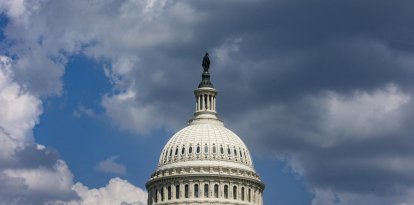Federal judge decides not to block Trump administration's plan to use IRS data to identify illegal immigrants
The federal judge's decision represents a real victory for both President Trump and his immigration agenda.

Migrants are processed by Border Patrol San Diego sector agents as seen from Tijuana, Baja California, Mexico.
U.S. District Judge Dabney Friedrich decided Monday not to block the Donald Trump administration's initiative to share highly sensitive tax information with the country's federal immigration authorities in order to track down illegal immigrants and deport them. Friedrich, who was appointed by the Republican front-runner in 2017, rejected the arguments of several immigrant rights groups, who claimed that the data-sharing agreement between Immigration and Customs Enforcement (ICE) and the Internal Revenue Service (IRS) violated various tax confidentiality laws.
The federal judge's decision represents a genuine victory for both President Trump and his immigration agenda, which has suffered numerous setbacks in recent weeks after several federal judges blocked or enjoined various measures the Republican administration had taken to rapidly increase deportations of illegal immigrants. The situation has become one of the biggest controversies of Trump's second presidential term after he publicly confronted the courts by accusing judges of being extremists.
Possible appeal
In his ruling, Friedrich concluded that the Trump administration drafted the data-sharing agreement with sufficient care to comply entirely with the law. The U.S. Department of Justice (DOJ) explained that requests for private data will only target immigrants who are under criminal investigation for disobeying deportation orders.
"Requesting and receiving information for civil enforcement purposes would constitute a cognizable injury, but none of the organizations have established that such an injury is imminent. The Memorandum only allows sharing information for criminal investigations. … On this limited record, the Court cannot assume that DHS intends to use the shared information to facilitate civil rather than criminal proceedings," the judge wrote in her ruling.
The attorney for the groups that sued the Republican administration, Alan Morrison, explained that he was disappointed with Friedrich's decision and is considering an appeal and further legal action. "[The judge] made it clear that DHS and IRS must comply strictly with the limited exception on which they relied. So far, DHS has not made formal requests for taxpayer data, and plaintiffs will be keeping a close watch to be sure that the defendants carry out their promises to follow the law and not use the exception for unlawful purposes," Morrison explained in a statement.
























